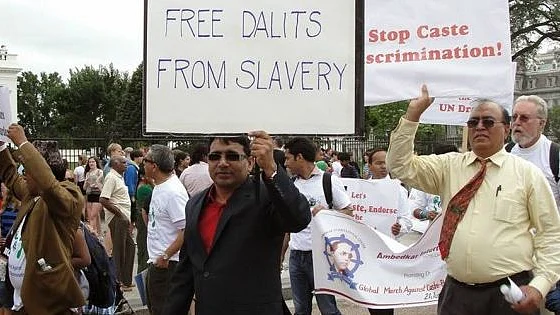London Diary: Parle Patel’s BBC documentary on UK Hindus’ caste problem
Patel, a popular Youtuber, says making the film was an ‘eye-opener’, as he calls for either a law to prevent caste discrimination or a massive ‘cultural shift’ among Hindus

“When a Hindu leaves India to go to UK or US they carry their Hinduism and caste system with them.”
This quote is from a London-based Hindu construction worker who says he left his job after being harassed by fellow Hindus because of his low caste. He has since abandoned Hinduism to escape its “tyrannical caste hierarchy”, as he put it.
He was among a number of non-Brahamins who appeared in a BBC documentary on the stranglehold of caste system on British Hindus. Even as they (rightly) complain about racial discrimination at the hands of native whites, upper caste Hindus have no compunction discriminating against fellow-Hindus from lower castes.
Made by Parle Patel, a popular young Youtuber, the documentary, “Hindus: Do We Have a Caste Problem?”, documents specific cases of caste-based harassment and discrimination.
One investment executive, who worked for a Hindu-owned company, tells him how he was forced to leave a well-paid job after suffering persistent humiliation by his high-caste bosses, and is now suing them for discrimination. We hear women complain of being denied entry into a temple in Leicester because of their “inferior” caste.
Patel says caste is seen as a matter of identity by Hindus and is “passed on to successive generations like a family tool box”.
Making the film was an “eye-opener”, he says calling for either a law to prevent caste discrimination or a massive “cultural shift” among Hindus.
The idea of a law has already been rejected by the government after pressure from right-wing Hindu groups; as for a “cultural shift”, as of now, there is no sign of it.
**********
Boris and Jennifer
Jennifer Arcuri, the American businesswoman, who is alleged to have had an affair with Boris Johnson when he was the mayor of London and financially benefited from her relationship with him, has said that they “bonded” over shared love for “classic literature and particularly Shakespeare”. Her claim has been met with sniggering guffaws: “Really, Jenny?”
It prompted one cynical and seasoned hack to recall how in the 1970s, the satirical Private Eye magazine coined the phrase “discussing Ugandan affairs” as a euphemism for sex after a woman columnist at a party “disappeared upstairs with a former Ugandan minister, later explaining her absence as having been to discuss Uganda”.
“I predict that ‘discussing Shakespeare’ may shortly enter the satirical lingo,” wrote Mathew Parris in The Times.
A former model, who first met Johnson at an event at a London hotel in 2011, Arcuri was awarded thousands of Pounds in official grants for her little-known technology start-up. She was also included in a number of foreign trade tours at the behest of mayor’s office prompting allegations of favouritism. Johnson is accused of a conflict of interest by not declaring his relationship with her and is being investigated.
Significantly, neither has denied an affair while insisting no favours were done to her. In a TV interview, Arcuri described the “electrifying” moment she first set eyes on Johnson.
“I turned around and there’s this guy that walks in the room with his hair all dishevelled and his shirt’s untucked and papers that looked like something I pulled out of my pre-schooler’s backpack. And he comes across the room and he proceeds to speak. And suddenly he turns the entire room of grovelling, curmudgeoned, angry men into howling schoolgirls,” she told ITV.
Rest, of course, is history.
***********
Grammar wars
English punctuation marks have always aroused strong passions: some find them infuriatingly confusing, even unnecessary; others swear by them.
Lynn Truss, author of the famously delightful 2003 book, “Eats, Shoots & Leaves: The Zero Tolerance Approach to Punctuation”, was dubbed a “grammar fascist” by some American critics.
Now, a new book, Cecilia Watson’s “Semicolon: How a Misunderstood Punctuation Mark Can Improve Your Writing, Enrich Your Reading and Even Change Your Life”, is causing excitement among grammar anoraks.
How strongly some feel about semicolon is illustrated by a quote from Milan Kundera: he says he “once left a publisher for the sole reason that he tried to change my semicolons to periods”.
***********
London’s first underground hotel
What do you do if you can’t build “up”?
Build “down” obviously.
And a property developer is doing just that in the heart of London —building a hotel which will be more underground than overground. Some 51 per cent of the £300 million building will be below the ground in what’s billed as one of the “biggest subterranean excavations seen in the capital”.
With restrictions on the height of new buildings in Central London, “there was only one way to do that and that was to go down”, according to Iype Abraham of the company behind the project. The 350-room Londoner Hotel with £500-a-night price tag is expected to open next summer.
London’s first big post-Brexit tourist attraction?
*********
And, lastly, here’s a new linguistic coinage: “Wagatha Christie”, coined by British tabloids to describe Coleen Rooney, wife of footballer Wayne Rooney, after her foray into Agatha Christie-style investigation to find out who was stealing stories from her heavily-restricted instagram account and selling them to The Sun newspaper.
And, guess, “whodunnit”, according to her?
Another WAG: Rebekah Vardy, wife of footballer Jamie Vardy.
But the jury is still out as Ms Vardy continues to deny she “dunnit”.
Follow us on: Facebook, Twitter, Google News, Instagram
Join our official telegram channel (@nationalherald) and stay updated with the latest headlines